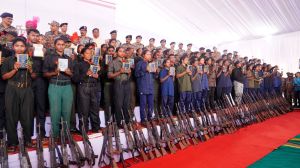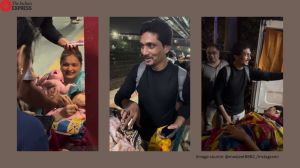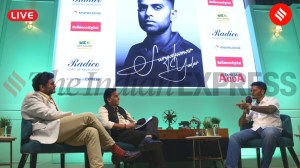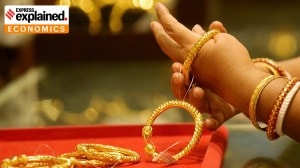Lively but should it be live?
February 8: Last week, BJP's Sushma Swaraj and Ghulam Nabi Azad of the Congress had a mouthful to say to each other on India Decides'98 (DD1...

February 8: Last week, BJP’s Sushma Swaraj and Ghulam Nabi Azad of the Congress had a mouthful to say to each other on India Decides’98 (DD1). While they squabbled, shrieked, anchors Nalini Singh and Pritish Nandy sat there, alternately trying to move the debate forward and looking helplessly on.
The other panelists hardly spoke and the public audience was a mute spectator. The Janata Dal’s Sharad Yadav (one of the guests) was sufficiently annoyed to complain. And though Nalini Singh had asked viewers to call in with questions for the panel, none came through. Thus was a live debate on a serious issue such as criminalisation of politics reduced to political posturing.
This is but one example. The national lives debates on DD have on the whole been exercises in futility, with the politicians either not answering the questions asked of them or simply fighting amongst themselves. This raises several issues for the telecasts: these debates are supposed educate viewers about the issues before the electorate:right?
“The policy most people seem to be following is — be loud, be brash and say nothing, ” reflects senior journalist, Dileep Padgaonkar who was an expert on the criminalisation episode. “Politicians are not interested in issues but are busy building a macho image for the voters”.
“I did not have any illusions about this debate being like a school one. It is a debate only in name. In fact, it is part entertainment and part education,” claims Prof.Pushpesh Pant, who moderated several of the debates.
Okay. If Padgaonkar and Pant are correct, then should precious air time (live at that) be spent on such tamashas? Pant thinks that the chaos is what people want to see. “Sitting on the panel, I did not really enjoy the fighting. But, all the people I met really enjoyed that chaotic debate,” he adds. Amitabh Matoo who also appeared on several shows and who didn’t get a chance to say much admits that the shows need to be more focussed. But he adds that “it was exciting to watch politicians getdown to their true selves. They cannot say I have been misquoted or quoted out of context,” In other words, the politicians are being exposed for what they really are. To that extent what happens in these debates is a true picture of political discourse in the country.
This is not the first time (and nor will it be the last) that television has captured our politicians’ unruly behaviour: live telecasts of parliament sessions and clips of the mayhem in the UP Assembly have already done that. Knowing this, shouldn’t the anchors lay down some ground rules before the telecasts and be firm in handling the participants once on the air?
“Situations like these are quite difficult to handle. You want the debate to move on but at the same time you don’t want to sound rude,” explains Nalini Singh. But, doesn’t trying to sound polite during a live show, waste everyone’s time? “I am not in favour of recorded programming,” says Singh, “Live debates bring out the heat and dust of the elections. Unfortunately, ourpoliticians are not aware of television protocol and citizens need to see that,” replies Singh. So, politicians need a television education.
What about the lack of public participation? In the shows seen so far the phone-ins have been negligible and the audience participation restricted to the minimum. “Our telephone lines are always jammed”, claims Singh, “Unfortunately, we had a technical hitch in one of the episodes. But otherwise, the participation of the common man is complete. After the show, I have to pacify a number of people in the audience who didn’t get a chance to say anything.” Viewers who have watched the shows will find this difficult to swallow: in the discussion on criminalisation of politics, there was not one question from the audience; and no phonecalls. The week before (when there were no technical hitches) there were just two phonecalls.
The exercise so far suggests that the conduct of live political debates on TV has quite some way to go before it can become really meaningful;that the participants must agree to behave with some decorum and that the anchors must forsake politeness for decisive action. But even then things might not be perfect. By its very nature, TV has never been known for depth, seriousness. Or, as Padgaonkar puts it, “Sound sense has always been a casualty of the sound byte.”






- 01
- 02
- 03
- 04
- 05

























